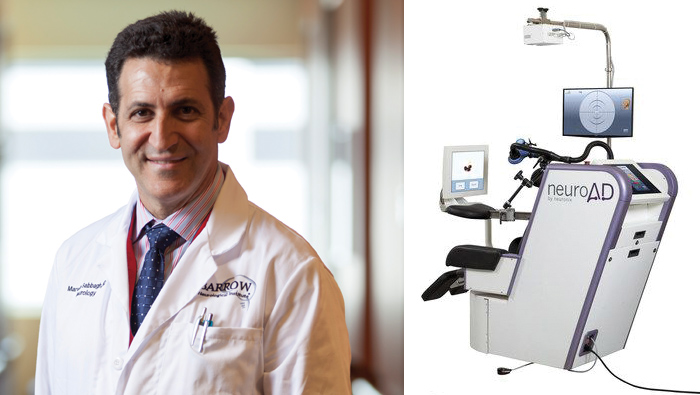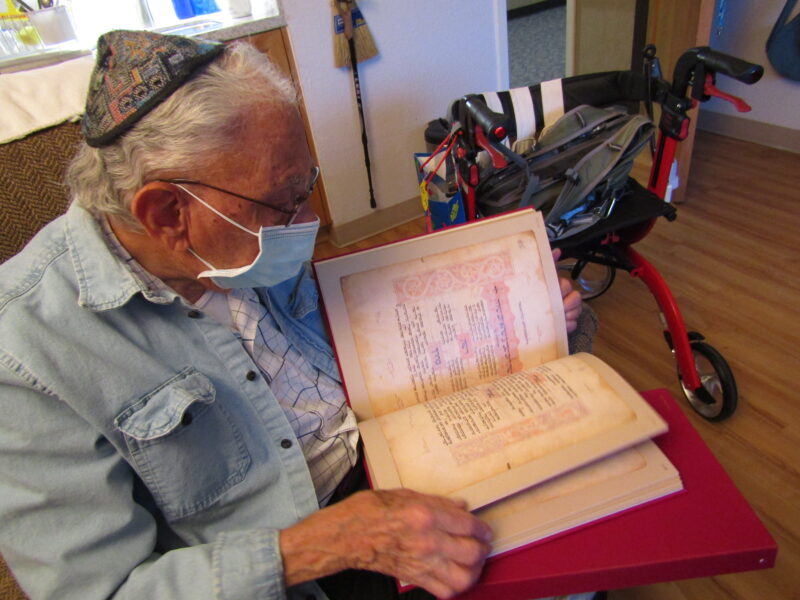With any luck, most of us hope to live to a ripe old age. If we take care of ourselves – and barring any twist of fate – we can expect to enjoy an active and functional life of independence as long as possible. Or can we?
Alzheimer’s disease, the most common form of dementia, is notorious for knocking such plans off track. It’s an incurable, neurodegenerative disease that strikes one in five people over age 65. The progression of the disease is different in every individual, but the outcome is the same for everyone: Alzheimer’s is fatal.
“Alzheimer’s disease represents everything sad and destructive about getting old,” says Marwan Sabbagh, M.D., F.A.A.N., C.C.R.I., neurologist, professor of neurology and director of the Alzheimer’s Disease and Memory Disorders Division at Barrow Neurological Institute at Dignity Health St. Joseph’s Hospital and Medical Center in Phoenix. Dr. Sabbagh is an expert in Alzheimer’s disease and dementia.
Dr. Sabbagh calls his work “my life passion,” though he readily admits to a “fear of getting old.” He was fascinated with research on the brain when he was in college and gravitated toward the field “when Alzheimer’s was a big unknown.” Dr. Sabbagh earned his medical degree from the University of Arizona College of Medicine in Tucson.
Memory impairment is one of the most common symptoms of the early stages of Alzheimer’s. As the disease progresses, more acute symptoms include aggression, confusion, speech difficulty, long-term memory loss and loss of bodily functions. The average life expectancy following diagnosis is seven to 10 years. Patients ultimately become fully dependent and/or institutionalized within four to five years.
Engaging in prevention
Throughout his career, Dr. Sabbagh has been involved in various clinical trials throughout his career on ways to treat and prevent Alzheimer’s. “BNI has a full spectrum of clinical trials in process,” says Dr. Sabbagh, including two called A4 and A5. These trials address prevention, while others address mild cognitive impairment and full dementia.
A4 is a prevention trial for participants ages 65 to 85 who are not showing any symptoms of Alzheimer’s but who are concerned about their memory – or the disease runs in their families. Dr. Sabbagh says the goal is to “try to alter their futures before they become symptomatic” through medication. They are screened and receive a PET scan to determine the presence of the Alzheimer’s protein, which can ultimately build up between brain cells and impair brain function. If it is present, then the individual is eligible for the trial, which is a three-year-long study.
A5 is the next generation of the A4 trial, “using the same paradigm but different medication,” says Dr. Sabbagh. A4 and A5 are separate studies and participants cannot take part in both. Dr. Sabbagh admits that participants “hope they don’t qualify for the studies, but they understand the process going in of what we are trying to do and why.” He stresses that there is always the possibility of a placebo, which is standard for these types of studies.
In light of everything that years of research and discovery have revealed about Alzheimer’s and dementia, Dr. Sabbagh says that “this generation is worried about memory. [The trials] are a great way to engage in prevention.”
Slowing the progression of Alzheimer’s
One treatment in particular in Israel, for which Dr. Sabbagh was the leading investigator, is showing early promise. Neuronix, headquartered in Israel with subsidiaries in the U.S. and the U.K., is the producer of the neuroAD Therapy System, a non-invasive, non-pharmaceutical treatment administered in an outpatient or clinical setting and designed to slow the progression of Alzheimer’s. Clinical trials in Israel, where the treatment has been approved, and at Harvard Medical Center have shown promising results.
The neuroAD system gives patients transcranial magnetic stimulation, or TMS, along with cognitive training exercises tailored to each individual. Stimulation of regions of the brain that control memory and learning can help to reactivate brain-cell activity to try to slow down the progression of Alzheimer’s. The treatment is typically used in conjunction with other therapies, including medication. Patients with mild-to-moderate Alzheimer’s showed improvement in memory within three months after six weeks of one-hour treatments, five days a week.
The technology has been approved in the U.S. to treat depression. Dr. Sabbagh says it is currently under review in the U.S. by the FDA “for approval of a specific adaptation with alterations that make it particular to Alzheimer’s.” He is confident that approval is imminent.
Reducing risk through diet
In a unique collaboration, Dr. Sabbagh and American chef Beau MacMillan developed a cookbook titled The Alzheimer’s Prevention Cookbook – Recipes to Boost Brain Health as a testament to the importance of diet. Admitting that “I’m a neurologist, not a chef,” Dr. Sabbagh offered his medical expertise on the subject and MacMillan came up with the recipes.
“We know that the onset of [Alzheimer’s] symptoms start 20 years after changes take place in the brain,” says Dr. Sabbagh. “The cookbook is written with an eye toward strategizing to reduce our risk starting today – and the easiest way [to do this] is to alter diet.”
He stresses that the cookbook is not a prescriptive diet but offers brain-healthy ways of eating that include reducing saturated fats, adopting a Mediterranean diet (abundant in fruits, vegetables, whole grains, legumes and olive oil) and adding more antioxidant spices to foods.
When asked whether Alzheimer’s or another form of dementia is inevitable if we all live long enough, Dr. Sabbagh gives a hopeful answer. “There seems to be some statistical evidence that you truly outlive your risk,” he says, adding that the chance is 33% by age 85, 40% by age 90. “The older you get, the higher the risk – though it’s not 100%.”
When it comes to Alzheimer’s disease prevention, Dr. Sabbagh offers this essential advice: “Be engaged. By the time you’re forgetful, it’s too late. You should not wait to seek medical attention. Being passive is not productive. If it’s treatable, we want to alter [the disease’s] future.”
To request an appointment with Dr. Sabbagh, call 877-879-9649 or visit barrowneuro.org. Learn more about neuroAD at neuronixmedical.com.
Mary Ann Bashaw, of Phoenix, is an editor and writer.






